Key takeaways:
- Pro-life advocacy values human life from conception to death, emphasizes compassion, and supports mothers facing unplanned pregnancies.
- Engaging local lawmakers through personal stories and community events fosters strong relationships and enhances their understanding of life-affirming policies.
- Using social media and grassroots mobilization can significantly amplify advocacy efforts and influence policy decisions.
- Tracking and measuring the impact of advocacy campaigns helps refine strategies and demonstrates the effectiveness of grassroots movements.
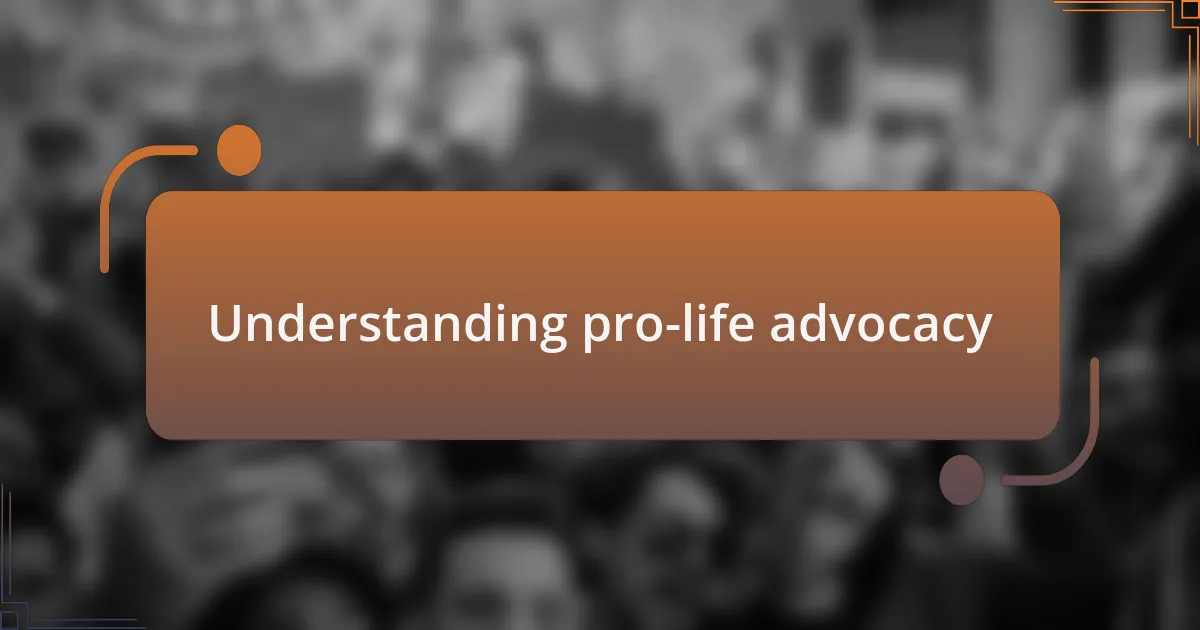
Understanding pro-life advocacy
Pro-life advocacy is fundamentally about valuing human life from conception to natural death. I often think about the moments when I stood with others at quiet vigils, feeling a deep sense of purpose. It’s not just about opposing abortion; it’s about creating a culture that protects and cherishes every individual. Isn’t it important for us to consider what brings people to advocate for life in the first place?
The pro-life movement also emphasizes compassion and support for mothers facing unplanned pregnancies. I’ve learned that offering resources—whether it’s emotional support, parenting classes, or financial assistance—can make a real difference. Have you ever considered how one person’s story can shift minds and hearts? It’s fascinating to see how sharing personal experiences can foster understanding and connection.
Additionally, understanding pro-life advocacy means recognizing the political landscape in which it operates. As I navigated discussions with lawmakers, it became clear that establishing respectful dialogue is essential. What strategies can we employ to ensure our voices are heard? Effective communication often opens doors, allowing for collaborative efforts that prioritize life-affirming policies.
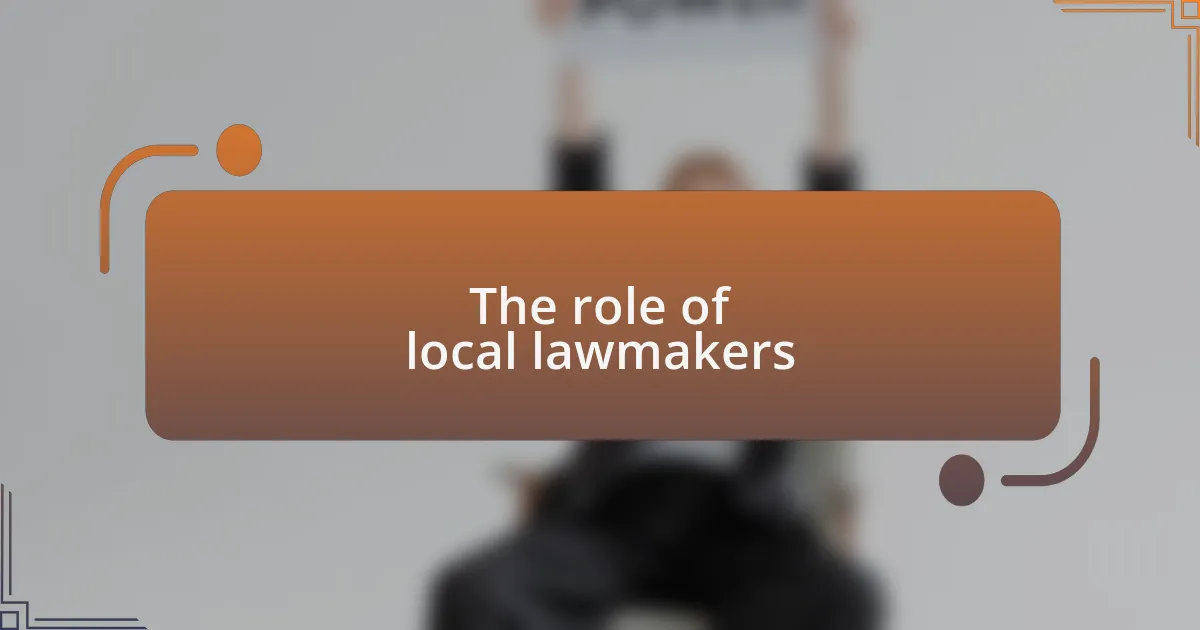
The role of local lawmakers
Local lawmakers play a pivotal role in shaping the policies that directly impact pro-life advocacy. I remember attending a town hall meeting where local representatives discussed legislation on maternal health. It struck me how crucial these leaders are in the conversations surrounding life-affirming laws. Have you felt that rush of hope when you realize your voice can influence those who represent you?
Connecting with local lawmakers isn’t just about advocating for bills; it’s also about cultivating relationships built on mutual understanding. I once reached out to a state senator after discussing my experiences at a crisis pregnancy center. That personal touch—sharing real stories—often resonates more than statistics, making lawmakers see the human side of the issues. Isn’t it fascinating how a well-timed conversation can change someone’s perspective?
Moreover, local lawmakers often serve as a bridge between the community and the state or federal government. I’ve witnessed firsthand how they can elevate grassroots concerns to larger platforms. Engaging them means not only sharing our passion but also inviting them to listen to the needs of their constituents. How can we make sure our lawmakers feel the urgency of our mission? By being persistent and approachable, we can foster an environment where they feel empowered to champion the cause of life.
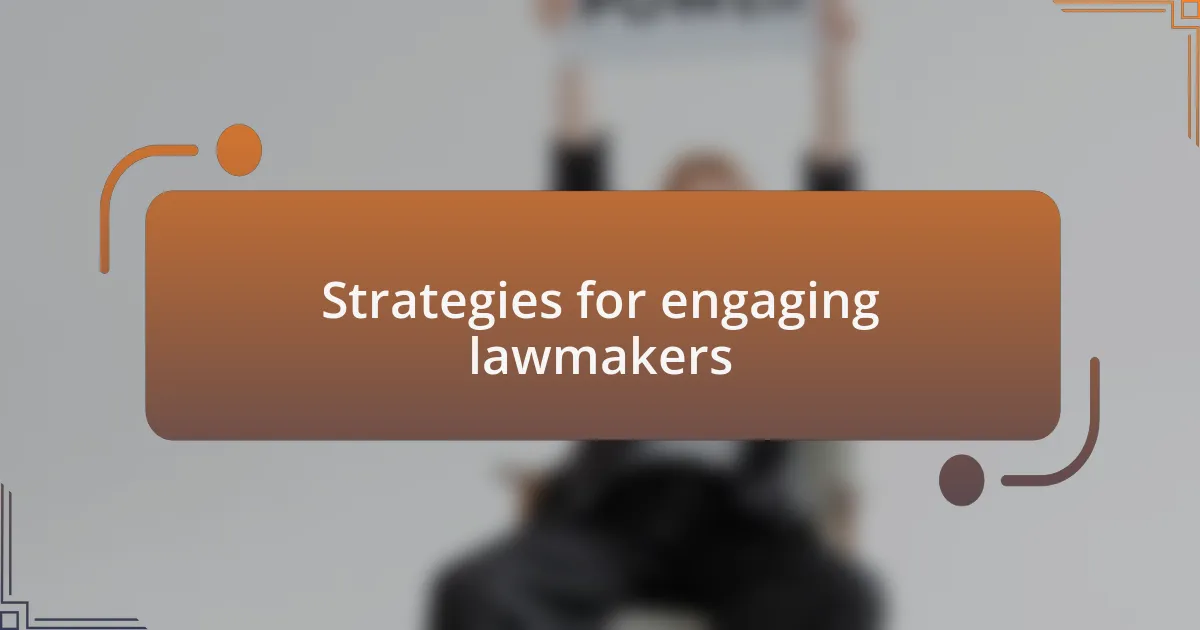
Strategies for engaging lawmakers
Building strong connections with local lawmakers is essential, and one effective strategy is to organize community events. I remember when I helped coordinate a pro-life rally in our local park. We invited lawmakers to speak and personally engage with attendees, bridging the gap between constituents and their representatives. Seeing lawmakers interact with passionate advocates in a relaxed setting was eye-opening; it highlighted how genuine relationships can flourish outside formal meetings.
Another impactful approach is to share compelling, relatable stories that evoke empathy. I once compiled testimonies from individuals whose lives were changed because of pro-life initiatives, presenting them alongside a letter to my local representatives. This not only demonstrated the positive effects of their decisions but also created a human connection they couldn’t ignore. Have you ever thought about how storytelling could reshape policymakers’ views? It’s a powerful tool that makes statistics feel personal and urgent.
Utilizing social media is also a game-changer in engaging lawmakers. I’ve seen how quick and targeted social media campaigns can get their attention and prompt them to respond. I recall posting a heartfelt message about the value of life, tagging my local legislators, and receiving a direct response from one of them. Isn’t it encouraging to know that platforms we use daily can amplify our voices? By harnessing the power of technology, we can create a dialogue that feels immediate and impactful, sparking essential conversations.
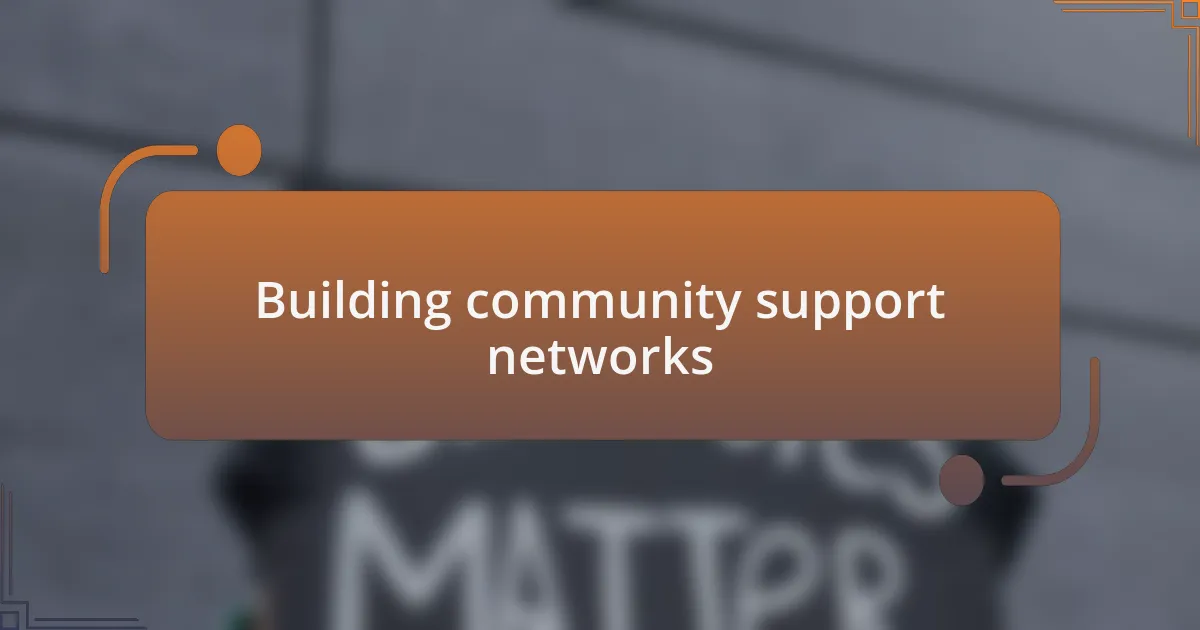
Building community support networks
One of the most rewarding experiences I had in building community support networks was when I organized a monthly meet-up for pro-life advocates in my neighborhood. These gatherings became a space for sharing experiences, strategizing, and encouraging one another. The energy in the room was palpable; when like-minded individuals unite, it creates an unstoppable force that can reach beyond our local issues. Have you ever felt that surge of motivation when surrounded by others who share your passion?
I also learned that collaborating with local organizations amplifies our efforts significantly. I reached out to nearby faith groups and non-profits to create a coalition focused on pro-life education. This partnership not only strengthened our messaging but also diversified our outreach, tapping into a broader audience. It made me realize how synergy among community members fosters a deeper impact. Have you considered what collective efforts could do for your advocacy work?
Lastly, engaging with local businesses can be a game-changer. I once worked with a local coffee shop to host a fundraising event for pro-life charities, and the turnout was incredible. The shop owner not only supported our cause but also drew in customers who were curious about our mission. It was a perfect example of how businesses can play a role in community advocacy, sparking conversations that might not happen otherwise. Isn’t it amazing how local efforts can weave into the larger fabric of community support?
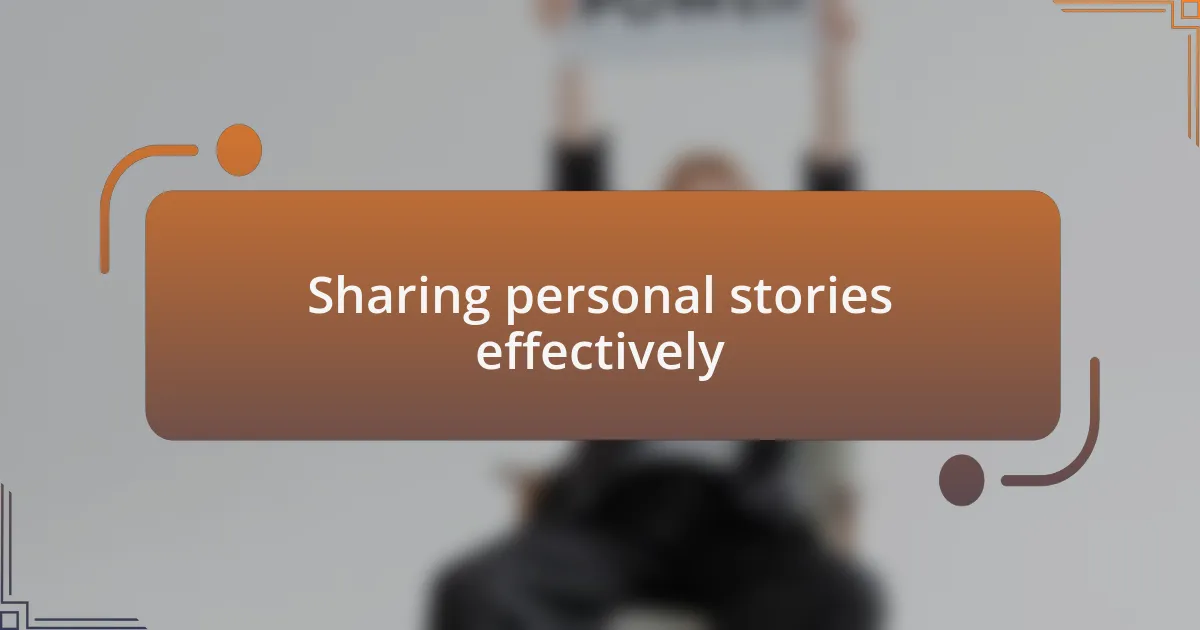
Sharing personal stories effectively
Sharing personal stories can be one of the most powerful tools in advocacy. I vividly remember the first time I shared my own experience with unexpected pregnancy during a local town hall meeting. The room was silent, and you could feel the weight of every word as I spoke about my fears and the choices I faced. That openness not only resonated with lawmakers but encouraged others in the audience to share their stories too. Isn’t it amazing how vulnerability can pave the way for understanding?
In my experience, effective storytelling is about connection. I once crafted a presentation for a legislative committee, incorporating narratives from individuals whose lives had been positively impacted by pro-life initiatives. Instead of just presenting statistics, I wove their voices into the fabric of my argument. This approach shifted the atmosphere in the room; legislators leaned in, engaged. Have you ever noticed how stories can transform numbers into relatable experiences?
Visuals also play a significant role in sharing personal stories effectively. I created a short video compilation of testimonials from women who had found support through our programs. When I showed it during a campaign event, the emotional responses were profound. It reminded me of the old saying: “A picture is worth a thousand words.” Have you thought about how a visual element could enhance your narrative and connect with your audience on a deeper level?

Methods for influencing policy decisions
One effective method I’ve found for influencing policy decisions is building direct relationships with lawmakers. I remember organizing a small dinner with a few local officials where we discussed our advocacy goals in a relaxed setting. This intimate environment allowed us to share our passion and insights authentically, making it harder for them to dismiss our points as mere statistics. Have you ever thought about the power of personal connection in politics?
Another approach I’ve utilized is engaging in grassroots mobilization. I recall a day when our team organized a rally where community members gathered to express their support for pro-life policies. The energy and enthusiasm were contagious, and it drew media attention, prompting lawmakers to recognize the public’s interest. Isn’t it striking how visible community support can sway political opinions?
Lastly, I’ve discovered that leveraging social media can amplify our voices significantly. I initiated a campaign that encouraged supporters to share their personal pro-life experiences online, utilizing hashtags to create a unified message. The response was overwhelming; we reached a broad audience, and even some lawmakers took note of the trend. Do you see how digital platforms can enhance advocacy efforts and make our voices heard?
![]()
Tracking and measuring impact
Tracking and measuring the impact of our advocacy efforts is crucial for understanding what works and what doesn’t. I remember sitting down after a major campaign to analyze the feedback we received. It was eye-opening to see how many people engaged with our message and how this engagement corresponded with lawmakers’ increased willingness to discuss pro-life issues. Have you ever tried to quantify the ripple effects of your activism?
To gauge our success more tangibly, we implemented surveys within the community. During one particularly revealing survey, I discovered that nearly 60% of respondents felt more informed about pro-life issues after our events. This data not only validated our efforts but also empowered us to refine our strategies moving forward. It made me realize that listening to the community is just as important as speaking out.
Finally, I’ve found it essential to monitor legislative changes in real-time. After a rally I organized, I noted a shift in public statements from a few lawmakers, indicating a newfound openness to pro-life dialogues. Tracking these changes not only provides a sense of accomplishment but also fuels our motivation for future campaigns. Have you ever thought about how even small wins can propel us forward?